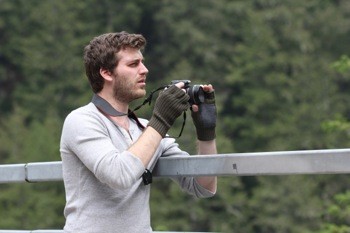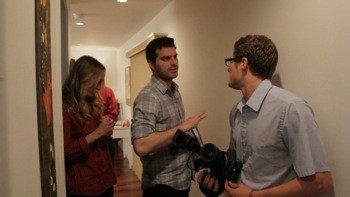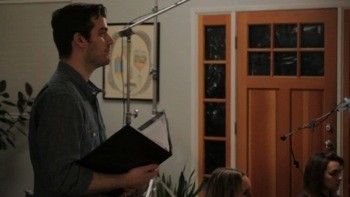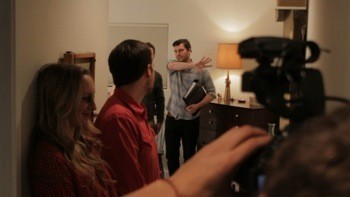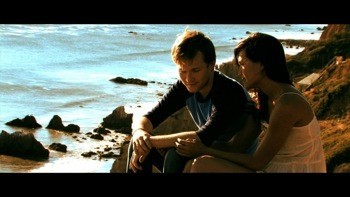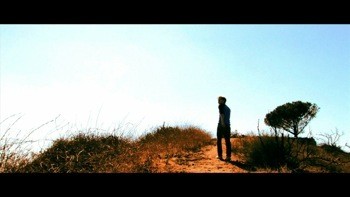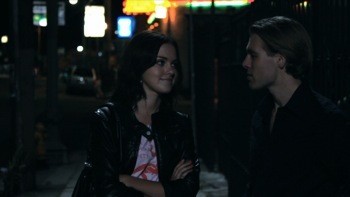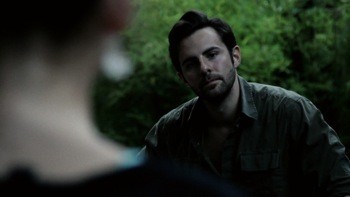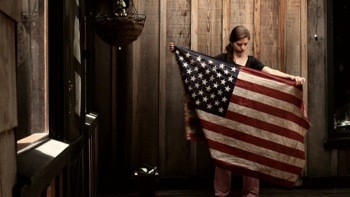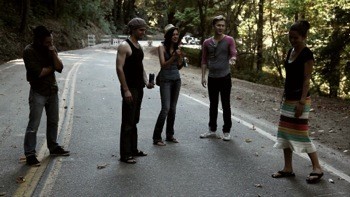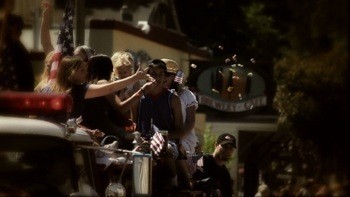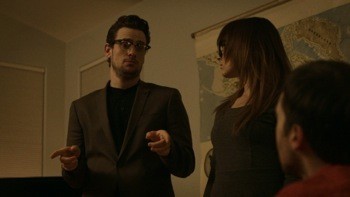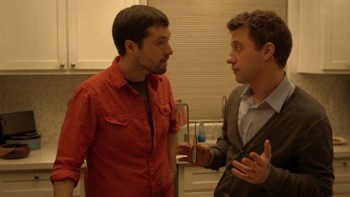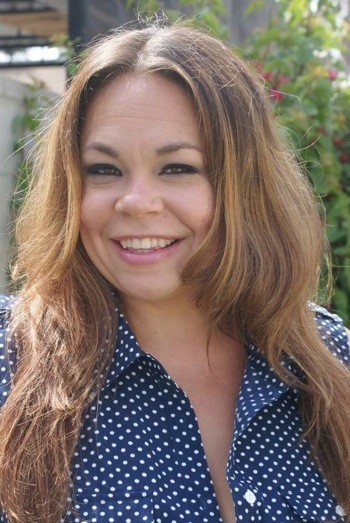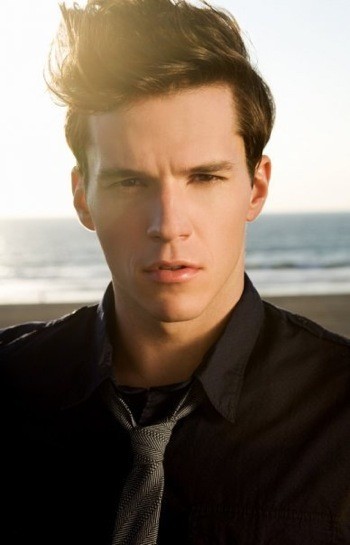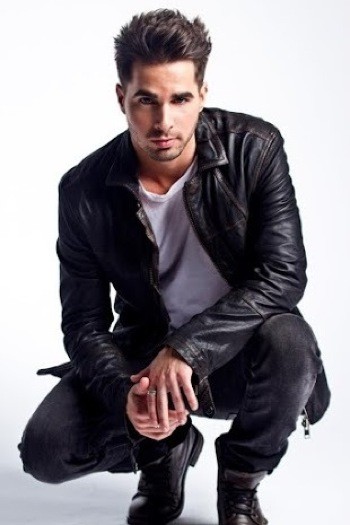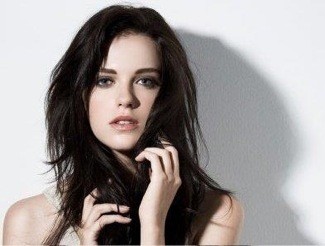On The Rise With… Cameron Beyl! This Talented Writer/Director Has A Unique Style All His Own!
On The Rise With…Cameron Beyl
Meet Cameron Beyl, an up-and-coming writer/director who has begun to make his mark in the world of film. A multiple award-winning auteur, Cameron has a unique style all his own…and it won’t be long until he’s a household name.
If you’re a regular reader of this column, the name may sound familiar, as this is my first companion piece interview! Cameron was mentioned in Heather Ann Davis’ interview a few weeks back, as the director of a couple of her projects. Now you get to hear tales of those projects from a different point of view. So sit back, relax, and read on to find out more about this passionate director!
Michael Marcelin: When did you first realize you wanted to be a writer/director?
Cameron Beyl: Well, when I was really little, I wanted to be an actor…so I would do plays at the local community theater…and when they started doing plays at my school, I would try to get into those. I was kind of frustrated that there wasn’t enough opportunity to play around, so I started making stuff just to give myself something to act in. And about two or three projects into it, I found that I really liked the process of making them…so that’s when it started shifting over. It was almost instantaneous. I didn’t care about being an actor anymore…even though I continued acting in my really early stuff, just because I didn’t know anybody else…but it was pretty instantaneous. I was about…eleven?
MM: Did you go to school for it, or did you develop your craft by just going out there and making films?
CB: A little bit of both. You know, from age 11 to age 18, nearly every day that I wasn’t in school was devoted to either shooting or editing or something. So I taught myself a lot of the basics. But film school…I went to film school at Emerson College, in Boston…that was a great experience, because it really kind of sharpened those skills, and told me why things are done a certain way. It opened my eyes to other forms of expression in the medium, and opened me up to a whole new world of films I hadn’t been exposed to. That changed the types of films I wanted to make. It went over everything I knew, but went deeper…learning the why’s instead of just the how’s.
MM: What kind of change did you make, in the types of films you wanted to create?
CB: It’s kind of a funny story, actually. When we were growing up, and you’re going out to the video store…which younger generations will never know anymore…you had to have everyone’s consensus on what you brought home. My brother was very combative over what we rented, and at the time, he didn’t consider any film less than two years old a movie anymore. So I grew up on a diet of new Hollywood films…the more mainstream studio stuff. So when I went to college, I was finally able to watch whatever I wanted, and I knew I had all of these classic films I had to catch up on…so I got a Netflix account and started watching everything I could. I think the most lightning strike of an experience I had during that time was seeing “Boogie Nights” my freshman year of college, because that was the first time I became acutely aware of the craft…it’s not just “you point the camera at something, you shoot it, and then edit it how you like”. There’s much more to every single little thing. And I became aware of camera movement and artful use of music, and characterization, and things like that while being exposed to new forms of movie structure, and new voices, and international films. I hadn’t really seen any international films until I was 18. It was like a watershed experience.
MM: Many directors have different views of film school. Some say it’s worth it, others say it’s useless and to just go out and film things. What’s your view on that debate?
CB: It depends. I’m starting to think that college, in general, isn’t really worth it anymore. I mean, I had a great experience, and I wouldn’t change anything about it. I want my kids to go to college. But I think we’re coming into a period where it’s becoming harder to justify going to college, because they would dangle jobs in front of you…that was your reward for graduation…you leave, you get a job, make lots of money. But I don’t think that’s really the case anymore. That being said, in regards to film school, I think if you’re interested in film, you should go and see if it’s the correct fit for you. Even if it’s just for a semester. I think a lot of people say they don’t want to go to film school because they can pick up a camera, start making their movies, edit them with computer software…and if they’re unsure of how something was made, they can pick up a Blu-ray and watch behind-the-scenes features and see how it was done. It’s film school in a box. What a traditional film school offers you is…connections. Not necessarily to producers or things like that, but collaborators. Some of my closest collaborators who I’ve made my films with, went to Emerson. It’s just a great network building exercise that raises your game, because you’re in a league with all of these people who are trying to do something. Yeah, it’s kind of competitive…and I think that’s healthy…but it’s a very fostering, supportive environment. It teaches you how to work in a team, and you make life-long relationships with people that you’ll be working with. So I think it’s every bit worth it, but it’s not necessarily for everyone.
MM: What was the very first thing you remember directing?
CB: I had a good friend who was talking to me about how he set up his Legos, and then he took his camera, he’d shoot a couple seconds, and then he’d move them, and shoot a few more seconds, and make little Lego movies. I thought that was kind of cool, me being 10 years old, so I decided to try it with my action figures. And it was literally just a really crudely made movie of this action figure falling off of a coffee table. That was the first thing I ever made. I can’t say I “directed” it. The first four or five movies I made with my good friend Matt Jay…who I grew up with and collaborated with a lot. We kind of fell into it together, and those were our first few films. We made these goofy little animated action figure films. And then we started putting ourselves in them instead, and then that kind of took off from there.
MM: Let’s move into your professional career. Tell me about your first project, “Burnside”.
CB: Well “Burnside”…I wouldn’t necessarily call that “professional”. I would say it was more of a student film that was a feature, basically. Matt Jay and I made it because we’d been making films for about ten years…it was the summer of 2007… and we were like, “Let’s make a big movie to celebrate that”. We thought, “T years…that’s a big achievement. A lot of kids don’t stick with things for ten years.” And we decided to make a film that was very heavily influenced by the stuff I was being exposed to in college. When we made it, I was going into my junior year, so I had been on this kind of binge diet of P.T. Anderson films. That was around the time when multi-character ensemble films like “21 Grams” and “Babel” and “Crash” were really popular. We wanted to do something like that, because we had a lot of friends we wanted to work with, and we had different stories we wanted to tell. So we decided to make a feature film about three characters in Portland who live along this prominent avenue called Burnside, which runs from the East side to the West side of town…there’s a big, iconic bridge that connects the two sides over the river…and we kind of saw it as a microcosm of the entire spectrum of Portland existence…from like junkies to well-off middle class people. This was before Portland gained its reputation as an indie film enclave. So we brought on a bunch of people who we wanted to work with, or who we reached out to and they wanted to help us out. It was the first time I worked with a director of photography other than myself. We shot it over the summer…Matt and I both directed it…I directed two of the segments, and he directed one…and then we just kind of mashed them together in an edit. That summer we released it, and had a brief run of about three days at a local art house theater in Portland. It was cool. It had a nice turnout, and even got a little review in one of the local papers. That said, it was a negative review, because it was a terrible film (laughs), but they were kind enough to say that the film had a lot of good stuff going for it. But now we look on it, and we’re mortified to watch it, because it’s a little pretentious…overbearingly depressive. It was just very melodramatic. We took what we thought of as dramatic material and just went off the deep end with it.
MM: Next up is “The Architect”. How did the idea for that one come about?
CB: That was my senior thesis in school. I had been working in architectural offices, like my dad’s, over the summers while I was in school…so I got to know that world really well. I had also read “The Fountainhead” that summer, and I liked it…which I shudder to think about now, because of who the author is and how she basically stands for everything I do not…but you don’t know that stuff at the time. But I liked the idea of a young architect trying to realize a building…I saw it as kind of an allegory for film school: you have a vision for something that’s kind of pure, and genius, and when you try to realize it, it’s set back with compromises and rejection and people who don’t believe in it…but if you get too invested in it, you run the risk of losing yourself. So the film charts him struggling to get this idea realized…he’s trying to win this design competition for a new prestigious building…and he gets so obsessed with making this perfect building that he alienates his live-in girlfriend, and almost loses her. But when everything sort of collapses around him in the end, he gains clarity and is like, “Oh no, this is more important…she’s more important…at the end of the day. I’m a young guy…I have my entire career to make something good. I don’t have to bang out a masterpiece right out the gate.”
MM: Did you win any awards for it?
CB: I didn’t. Emerson College has this awards ceremony, called the Evvys, which is basically like a student Oscars at the end of the year. It’s cool, because it’s the largest student-run awards show in the country, so to even be nominated for it is a pretty big thing, at that stage in your life. I didn’t personally get nominated for anything, but my lead, Kerem Bursin, was nominated for Best Outsanding Performance for the film. He should have won…but I can’t judge that objectively (laughs).
MM: Your next project was the feature “So Long, Lonesome”.
CB: I would consider this one my first “mature” feature. There’s a certain point where I don’t want to show anyone my old stuff, because it’s so bad. But “So Long, Lonesome” is the first of my works where I’d say, “Okay, this can be public ‘me’”. I had gotten out of college, and I had really wanted to follow up on the momentum of it, and make something for very little money, for three reasons. One is that I’m the kind of guy who will go insane if I’m not working on something. Like, if I have to have a day job, I try to find the time to write or do something else. I need to have something going on, or else I’ll feel like I’m wasting my life. The second was that I was looking for work. I had nothing else to fill my time with, and I felt it was very important to take this time, because maybe I wouldn’t get it again…I’d be working too much to really try and make a feature. And you hear stories about people making features right out of college and launching careers, so I wanted to make sure I explored that avenue in case that worked out for me. It hasn’t so far (laughs). And the third was that this would be the only chance I’d get to make a film as experimentally as I wanted to make it.
The film was inspired by the loss of a good friend of mine from childhood who had died of Cancer in 2007. It kind of came out of my own personal reflections on the experience. It’s a love story, but the person who passed…we had only just been friends, so that part of it wasn’t the inspiration. It was the first person my age who had died, and that’s kind of when it hit home. You know, you go through your 20s thinking you’re invincible, but I got a lesson very early on that that’s not the case. I was grappling a lot with that idea of life and death, and I wanted to make a very experimental, visually beautiful film about that, while exploring ideas about the afterlife from a non-religious perspective. So I banged out a script about a young man who loses the love of his life in a car accident, and kind of spirals into this downward depression, and can’t really rise above it. Then finally, one night, he succumbs to his own sleeping pill addiction…and as he’s dying, he has a fever dream, which is the film. It’s kind of the last synapses of his brain firing off, remembering his life…like how your life flashes before your eyes before you die. I wanted to find a cinematic way of telling that. So it’s an experimental…abstract, and heartfelt…moving film.
MM: How was it received, upon completion?
CB: I was actually really surprised by how it was received. I didn’t make it thinking it would go into Sundance or anything like that. It was such a low budget, low tech kind of shoot…you know, stealing locations and all that…but it got into the Zero Film Festival, here in L.A., and I was just happy to get it in. That was my goal: to get it into “a” film festival. Then it won Best Feature at that festival, which was a real shock. That was just a very encouraging thing to happen, so early in my career. I had never won anything before for my work, so it was very encouraging to get that recognition, and to know that I wasn’t terrible (laughs).
MM: Next up was the short, “Happy Hour”, your first professional job where you weren’t the sole writer on the project. What about this project made you interested in directing and co-writing it?
CB: Well, “Happy Hour” started as just a series of conversations between Joey Snyder Kloos, Megan Lee Joy, Heather Ann Davis, and I. At the time, we were all hanging out, and we would get into really long conversations about what it means to be in our 20s…what it means to get older, in that respect, and dealing with big life things while feeling like you’ve never really quite made that transition into adulthood. That’s kind of the dirty secret of adulthood: you never really feel like an adult. All three of them had some work under their belt, but they wanted to kind of beef up their own bodies of work. They wanted something really fun, really challenging, and really interesting to work on, and I was more than game to help write and direct them on this project. I really wanted it to be a collaborative arena, as far as the writing went, because they had been so essential in the genesis of the idea that I couldn’t imagine creating it without their input. I think they came up with this giant roll of paper with ideas, and Joey and I ended up banging out the actual script from that roll of ideas, and kind of massaged the story…making it into something cohesive…and we shot that very low tech, low budget as well. I was pretty pleased with how that came out.
MM: And this one won an award as well.
CB: Yeah, when that was finished, we went back to Zero Film Festival the next year and we got the “Best Mid-Length Film”. It was nice that they recognized it. It was further validation. I kind of felt like I was on a roll, which was nice.
MM: Your next feature, “Here Build Your Homes”, was a very ambitious project. Tell us how you came up with the idea for it, and why you wanted to go the improv route.
CB: Well, it was an ambitious project. It was perhaps too ambitious. I was driving through the Redwoods forest with my friend Puneet Layal, who was one of the producers on “So Long, Lonesome”, and we were struck by the beauty of the Redwood forest…specifically by this little town called Boulder Creek…this little mountain town that’s very rustic, and very steeped in Americana, and very picturesque. We started throwing ideas back and forth…thinking it would be really cool to shoot here. And I remember this very distinctly: as we came around this bend, which is like a two lane road that kind of curves through the forest…and there were these giant Redwood trees sort of towering over us…and there’s these little cabins that are peppered all around…I see this little cabin. And there is a young woman standing alone on the porch, with a blanket wrapped around her, nursing this mug of coffee, and I started wondering what was going on inside the cabin. Like, “Who’s there with her? What’s that story?” And I got the idea that it would be fun to do a down and dirty kind of project. I had been working on a bunch of other scripts that I thought might be my next project after “So Long, Lonesome”, but they were a bit more ambitious…would take more money to make…and I was growing a little restless, not having something to shoot, on a feature scale. So I thought, “This would be a really good excuse to take four days off…go up to Boulder Creek and shoot something for very little money, and just pop out a really quick feature by having everyone come up with their characters, and live in their characters for four days, and just document it with two cameras and fashion it into a film. Even if nothing else happens, maybe it would be interesting, at least for me, to see how these people interact and how they live their lives in this gorgeous setting.” Because I knew I could do something with this setting. I knew that I could make it feel evocative, and make it feel like another character. And I liked the fact that I didn’t have to write a script for it…I could just kind of shoot it.
By the time we emerged from the Redwoods forest the first time through, we kind of had the story set. It was going to take place on the 4th of July…we’ll come back on the actual holiday and shoot the parade Boulder Creek had…and then shoot over Labor Day weekend that year. We raised the money through Kickstarter, which had kind of just started becoming popular. It was probably my favorite shoot so far, because it was very creative…but I was burning on all cylinders all three days. It’s crazy when you have six actors coming up to you and asking “What next?” while you’re trying to run two cameras, with no script. But I gave everybody objective cards at the beginning of each day, like “Here’s what you need to do today”. And it was never “You need to do this today”, but more like, “Keep this from somebody”. They were all meant to generate conflict, but it was vague enough so that they had the power to take it where they wanted to go. The funny thing about that, as the shooting went on, and we kind of realized what the story was…we started making more and more concrete decisions about what needed to happen. So by the end of the shoot, we knew we had to end the movie on a conclusive note. We know we need this beat, and that…shoot this, shoot that…do something like this, say something like this…and then we’ll wrap it up. Funny enough, that taught me more about the scripting process than writing a script had ever done…because it was like reverse engineering a script, in a way, knowing proper set ups and pay offs and how to tell a story. It was just a really creative and fulfilling shoot. I was surrounded by friends for those three days and it was a lot of fun. And very little sleep.
MM: Would you ever do another improv film again?
CB: I thought I wanted to. I had it in my head that I wanted to do…coming off of the high of that experience…a loose trilogy of films like that. I call it my “California Trilogy”, where you pick like, the Redwoods, and the others would be Big Sur, and Palm Springs…make a similar kind of thing with different set-ups and different storylines…but use this type of filmmaking to capture these specific parts of California. But for me to do that again, and for it to be successful, I think I’d need to be a more successful filmmaker than I am right now. The big problem with “Here Build Your Homes” that I took away from is the “who cares” factor is crucial. It’s very hard to get people to care about six pretty people in the woods having First World problems. And that’s a genre, especially in the independent world, that has been done to death. So it’s going to make it really hard to stick out. We thought the improv angle would help it stick out a bit more. I hear from people who think that not a lot tends to happen. I think that a lot happens, but it all happens underneath the surface…it’s all emotional. It’s not people killing each other. It was interesting, because it taught me what people care about, and how to reconcile that with the kind of stories I want to tell. It helped shape the kind of scripts that I’ve written since then, which is good. It was a great shoot, and a great lesson as well. I would not change a single thing about it.
MM: How many hours of footage did you end up having?
CB: The original cut ran for four hours. We probably had 32 hours of footage that we had to whittle it down from…per camera. The edit time line was insane, because I had six channels of sound, and then two simultaneous video tracks synched…figuring out the best parts of each scene. So I thought this little film that would be quick and easy to bang out and have ended up taking almost two years in editing.
MM: Have you had anything happen with the film, at all?
CB: We took it to the Oregon Independent Film Festival. That’s the only festival we got into…we got kind of shut out from everything, because I think it’s one of those films that you either hate it, or love it. We took it up to Oregon, in Eugene, where I had lived when I did a semester at the University of Oregon, which was really cool. I got to take my wife, who was then just my girlfriend at the time, and got to show her my old stomping grounds. I ended up winning Best Director there, which was really cool. I think I was kind of dismayed a little bit by the lack of enthusiasm for the film, and I felt my momentum had been thrown off…that maybe I’d over-reached. I had been so emboldened by the success of “Happy Hour” and “So Long, Lonesome” that I veered too much into “Pretensionland”. But winning Best Director was just a nice validation…like, “This is how the industry works. You don’t win everything…or a lot of people don’t care, but some people do.” And when they recognize that, it makes it more special, I think.
MM: Most recently, you co-wrote and directed your first comedic short film, “Matchbreakers”. Tell us about the story, and why you decided to tackle a comedy this time around.
CB: Funny enough, a lot of these things start with college. It started with my friend Kyle Andrews…who’s an actor I had met at Emerson…and we had made another low budget feature in college called “Strawberry Melancholy.” It was a romantic comedy. I wanted to try my hand at that specific genre because it’s not the type of genre I wanted to work in. But I wanted to see if I could conform it to the way that I like to make movies and the kind of movies that I like…so there’s kind of a mean-spirited edge to it. (laughs) And I also wanted to get it out of my system. I wanted to get the archetypical “guy running to this girl who he realizes he’s in love with…yelling out the window” movie out of my system early on, so I wouldn’t be doing that professionally. So Kyle was my main partner on that…he was the lead actor…and we had a great time shooting the film. A few years ago, he moved to L.A. to make a go at the acting thing…he had done an independent feature in Boston, and was looking to get more stuff for his reel. He came to me and suggested we shoot a little scene for him to put on his reel, but I thought, if we’re going to go take the time to shoot a scene… why not just shoot a short? Let’s make something. And he was totally down for it. We spent a lot of time hammering out the idea…about a year…because I have a really hard time writing short films. Character depth and slow development…two hours plus run time…I can do that in my sleep. But short films are tough! I have a hard time writing and keeping that condensed. So we took the time to write the script, and…Kyle’s very good with comedy…he’s got a great range…and we brought friends aboard we wanted to work with, like with “Happy Hour”…raised the money through Indiegogo, and we shot it last January. I’m actually rendering out the final coloring as we speak, so it should be done hopefully by the end of the month and ready to go out into the world by December. That was my first project back from the setback that “Here Build Your Homes” had done to my confidence in filmmaking. And I felt like the stakes were high, so I wanted to go the other way from improv and stuff like that, and really zone in on craft.
MM: Do you have any upcoming projects in the mix that you can talk about?
CB: Mainly just writing projects, so far. I’m shooting a little comedy sketch with some friends in a few weeks, but it’s been a lot of writing. It’s all kind of geared towards bigger budget ideas, but still stuff you can fund on an independent scale. Things that are a little more genre related and audience friendly. I think with “Here Build Your Homes”, I hit the ceiling with what I could do with low budget filmmaking, and I needed to break that ceiling with something a little more ambitious. But the flip side of that coin is that it might take longer to get off the ground, so I feel like my work has kind of slowed down recently, in terms of output, but I’ve been writing up a storm. The plan is to get them in great shape and see what happens first.
MM: What advice would you give directors and writers who are still trying to make it in the entertainment industry?
CB: I would say keep on making things…never stop. Because any time spent writing or making films is never time wasted. It’s time developing your craft. I would also advise you to expand your influence outside the world of film. There’s all sorts of things you can get inspiration from. Architecture…music… fine art…even cooking. It all kind of informs things. And it’s a great way to expand your worldview, which will make you a better, well-rounded storyteller. I know a lot of filmmakers who are so in their own heads about what they’re doing, and it’s a very narrow set of resources that they’re drawing from…they only like a certain filmmaker, so they only watch his or her films on loop…and the stuff that they write is just an emulation of that. I guess there’s a place for that, but I think that to truly make a film of your own is to bring a lifetime of experience to it that isn’t just related to cinema. So it’s kind of a three point thing: keep on making stuff, develop outside interests and relationships, and watch all kinds of films. Do the leg work of broadening your base, because when you expose yourself to other voices and types of filmmaking, it makes your own set of resources and inspiration grow.
MM: What movie do you wish you could have written and directed?
CB: I would have loved to have made “Nightcrawler”. That would have been an awesome film to make. I find that’s kind of where my writing is going, is into that brooding crime thriller genre. There’s a few things in that vein. If I had seen that script, and I had an agent, I would have knocked down his door to get me a meeting.
MM: Who are some of your influences?
CB: Well, there’s the perennials: Terrence Malick, John Cassavetes, Michael Mann…those three guys kind of shape the different facets of my personality as a filmmaker. I think I get the emphasis on beautiful visuals and sense of place and time from Malick, and the tendency to experiment. I think I get the immediacy and independence from Cassavetes…the courage to just go out there and damn all the consequences…just never apologize for your art. And I think I get the discipline from Mann. There’s also Scorsese, P.T. Anderson is a huge influence, Fincher, David Gordon Green’s early stuff. And I guess I have to say Kubrik (laughs).
MM: If you had unlimited access to funds…what kind of movie would you go out and make tomorrow?
CB: I’ve really been wanting to make a sprawling, three hour crime drama set in L.A. It’s a little bit psychedelic, like “Apocalypse Now”. I would make that.
FYI
Movie: Heat, The Assassination of Jesse James
TV Show: True Detective
Director: Terrence Malick
Book: Just Kids
Food: Burritos
Score: The Village
Video Game: Goldeneye


